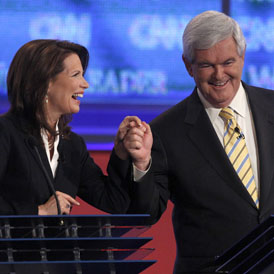Mitts off as US Republicans go head to head in first debate
Channel 4 News’s US politics commentator Felicity Spector gives her reaction to the first major debate between the Republican presidential contenders.

And then there were seven: the leading Republican presidential hopefuls went head to head last night, in what’s being seen as the official launch of the party’s 2012 campaign.
In the all-important state of New Hampshire, the contenders took part in a prime time televised debate, covering everything from Afghanistan and the debt ceiling to health care.
For some, it was a particularly good night: front runner Mitt Romney, the former Massachussetts Governor, gave a solid performance, focusing his firepower on Barack Obama as if he were in the presidential race already.
It seems the GOP had decided to stick to a unified script, attacking the President rather than each other – and that gave Mr Romney something of a free pass on the health care plan he signed into Massachussetts law.
In fact, another potential frontrunner, the former Minnesota governor Tim Pawlenty, had been expected to lay into Mitt’s record. But he backed off bigtime when it came to the crunch. Strange, because on Fox News Sunday he launched a fierce attack on what he rather clumsily termed “Obamneycare” – echoing the charge that Romney’s policy which required residents to take out health insurance was exactly what the White House wanted to enforce today.
Yet last night there was no follow-through – despite every opportunity to continue his line of attack. The debate’s moderator John King put it to him straight: “Why would you… choose those words maybe in the comfort of a Sunday show studio? Your rival is standing right there. If it was Obamneycare on Fox News Sunday, why isn’t it Obamneycare standing here with the Governor right there?” Nothing. Apparently Pawlenty didn’t want to come across as too negative, yet most pundits agreed it simply made him seem weak.
Perhaps Michelle Bachmann had better advice on how to play the event: making sure she featured in all the headlines by formally announcing her candidacy right up there in the very first answer. In the absence of Sarah Palin, Ms Bachmann siezed the role of confident conservative, with none of the loony-tunes associations of Herman Cain, and none of the baggage of Newt Gingrich.
Instead, she managed to make a decent impact, as someone well versed with the issues, while introducing herself to the wider public on a national scale: not just politician, but businesswoman, and foster-mother to 23 children. Yes, 23. And to be sure we remember that, she managed to mention it three times.
As for Mr Gingrich, well, he’s still reeling from the wholesale departure of his top campaign team, and he didn’t do himself many favours by getting embroiled in a question about his rather controversial remarks about Paul Ryan’s Medicare plan, which he called “radical” and “right wing engineering”. Gingrich has since apologised – insisting those remarks were taken out of context. But last night, his frankness may not have helped him much: “If you can’t convince the American people it’s a good idea, maybe it’s not a good idea.” Which might be all very sensible, except that House Republicans have already endorsed the Ryan plan.
For the Democrats, it was a chance to mock their opponents, with an instant video on Youtube featuring a montage of soundbites on issues like gay marriage and the space programme, which made the contenders look irrelevant and out of touch.
Satire aside, the night probably belonged to Mitt Romney – solidly ahead in all the most recent polls, and armed with a major cash advantage over his rivals. But anything could happen. One Gallup survey showed that although 24 per cent of Republicans back Romney at this stage – fewer than a third of them said they were certain they’d stick with him. Solid he may be, but that’s not quite the kind of quality to capture the public imagination.
An instant verdict on this first debate? A decent show of unity, and a vibrant exchange of views – but the GOP still seems like a party in search of a powerful vision for the future – and a star candidate to get them there. There are seven months to go before the first primary vote – the search for star power goes on.
-
Latest news
-
As India goes to the polls in the world’s largest election – what do British-Indians think?6m

-
Tees Valley: Meet the candidates in one of the biggest contests coming up in May’s local elections4m

-
Keir Starmer says public sector reform will be a struggle7m

-
Nicola Sturgeon’s husband Peter Murrell charged with embezzlement of funds from SNP1m

-
Ukraine might finally get $60billion in American weapons and assistance to defend against Russia3m

-




